 Paapa Essiedu’s antic scenes as Hamlet were amazing. Powerful, graceful, physical, unpredictable, his presence at the heart of the RSC’s anniversary-year Hamlet created real urgency and danger in what was (I must admit) a pretty long-feeling production. Once he put his antic disposition on, with the help of an inventive paint-smeared costume, he pulled away from the other actors into his own private manic dance.
Paapa Essiedu’s antic scenes as Hamlet were amazing. Powerful, graceful, physical, unpredictable, his presence at the heart of the RSC’s anniversary-year Hamlet created real urgency and danger in what was (I must admit) a pretty long-feeling production. Once he put his antic disposition on, with the help of an inventive paint-smeared costume, he pulled away from the other actors into his own private manic dance.
It’s a play about a solitary melancholic, but I thought it was telling that only one of the two soldiers on watch in the first scene seemed to have met the Prince before. This Hamlet wasn’t easy to know. Ophelia showed us love letters and even an “H & O” hand-painted t-shirt, but she couldn’t reach him either.
In those mad moments and the soliloquies, Essiedu’s Hamlet was gorgeous and inventive, powerful to watch. I did wonder a bit about the old-fashioned “objective correlative” business, in that it was hard to believe that this Hamlet could have loved his father (or anyone) as much as he professed. In general, he seemed brilliant but loveless and deeply unattached: the eventual graveyard expostulation, “I loved Ophelia,” came across as a bit unconvincing. Who was there?
But perhaps that flatness emerged because the graveyard scene came after Hamlet replaced his madness with a red wool knit cap of sanity, having returned from the pirates, condemned his treacherous friends Rozencrantz and Guildenstern, and apparently believing his own Providentialist boilerplate about the fall of a sparrow. I tend to see this final Hamlet as still violent and unstable, but that wasn’t apparent in this production, at least not until the (quite striking and visually great) stick-fighting-as-swordplay scene.
Of the surrounding players, I though Gertrude was very weak and unconnected to the other figures on stage. (I admit I missed the closet scene, b/c I was bringing Olivia home at the interval. Too much nihilism for her!) Ophelia started well, in a winningly comic fashion with her father and brother, but her mad songs, which should be heart-wrenching, didn’t for me match Hamlet’s preceding insanity. The prince who was but mad in craft put her in shadow.
There was a moment in the final scene, when Laertes and Hamlet have been cut with venomed blades and Gertrude has drunk the poison, in which Claudius stood alone on stage, caught as his villainy was being revealed. I had the odd sensation that in that short gap of time, he should run: none of the wounded men could have caught him, and surely the guards would remain loyal to their sovereign. I spotted Clarence Smith, who played Claudius, at the pub after the show and almost asked him about it — but I figured that would have been a bit obnoxious. “Have your ever thought about just running offstage just before Hamlet gets up…?”
The other performance I loved in this production was Cyril Nri as Polonius. Some of the air that went out of the second half of the play for me had to do with missing his stage presence and (admittedly forced) cohesiveness. I’m becoming increasingly interested in Polonius as an alternative center in the play; he presents distinctive theories of acting, of genre, and of politics. Does that make me sound like the old suburban Dad that I am? Yesterday I liked Cloten, today Polonius. What is Stratford doing to me?
[…] intensity carried me along. He’s a rising star, as I already guessed when I saw his Hamlet in Stratford in 2016. I thought his Edmund was even a tick better. He’s one to keep an eye […]